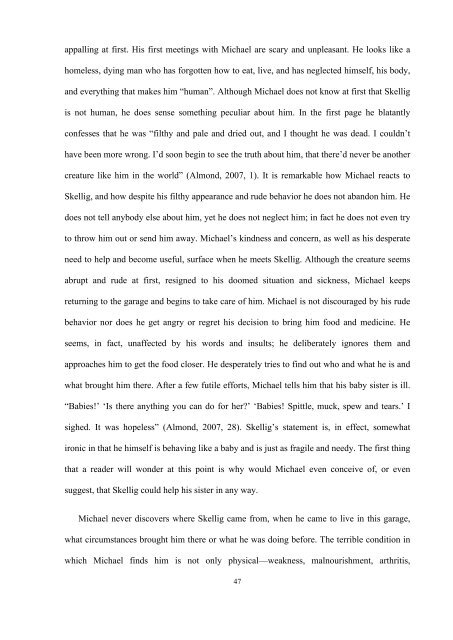The secular angel in contemporary children's literature: David ...
The secular angel in contemporary children's literature: David ...
The secular angel in contemporary children's literature: David ...
Create successful ePaper yourself
Turn your PDF publications into a flip-book with our unique Google optimized e-Paper software.
appall<strong>in</strong>g at first. His first meet<strong>in</strong>gs with Michael are scary and unpleasant. He looks like a<br />
homeless, dy<strong>in</strong>g man who has forgotten how to eat, live, and has neglected himself, his body,<br />
and everyth<strong>in</strong>g that makes him “human”. Although Michael does not know at first that Skellig<br />
is not human, he does sense someth<strong>in</strong>g peculiar about him. In the first page he blatantly<br />
confesses that he was “filthy and pale and dried out, and I thought he was dead. I couldn’t<br />
have been more wrong. I’d soon beg<strong>in</strong> to see the truth about him, that there’d never be another<br />
creature like him <strong>in</strong> the world” (Almond, 2007, 1). It is remarkable how Michael reacts to<br />
Skellig, and how despite his filthy appearance and rude behavior he does not abandon him. He<br />
does not tell anybody else about him, yet he does not neglect him; <strong>in</strong> fact he does not even try<br />
to throw him out or send him away. Michael’s k<strong>in</strong>dness and concern, as well as his desperate<br />
need to help and become useful, surface when he meets Skellig. Although the creature seems<br />
abrupt and rude at first, resigned to his doomed situation and sickness, Michael keeps<br />
return<strong>in</strong>g to the garage and beg<strong>in</strong>s to take care of him. Michael is not discouraged by his rude<br />
behavior nor does he get angry or regret his decision to br<strong>in</strong>g him food and medic<strong>in</strong>e. He<br />
seems, <strong>in</strong> fact, unaffected by his words and <strong>in</strong>sults; he deliberately ignores them and<br />
approaches him to get the food closer. He desperately tries to f<strong>in</strong>d out who and what he is and<br />
what brought him there. After a few futile efforts, Michael tells him that his baby sister is ill.<br />
“Babies!’ ‘Is there anyth<strong>in</strong>g you can do for her?’ ‘Babies! Spittle, muck, spew and tears.’ I<br />
sighed. It was hopeless” (Almond, 2007, 28). Skellig’s statement is, <strong>in</strong> effect, somewhat<br />
ironic <strong>in</strong> that he himself is behav<strong>in</strong>g like a baby and is just as fragile and needy. <strong>The</strong> first th<strong>in</strong>g<br />
that a reader will wonder at this po<strong>in</strong>t is why would Michael even conceive of, or even<br />
suggest, that Skellig could help his sister <strong>in</strong> any way.<br />
Michael never discovers where Skellig came from, when he came to live <strong>in</strong> this garage,<br />
what circumstances brought him there or what he was do<strong>in</strong>g before. <strong>The</strong> terrible condition <strong>in</strong><br />
which Michael f<strong>in</strong>ds him is not only physical—weakness, malnourishment, arthritis,<br />
47
















